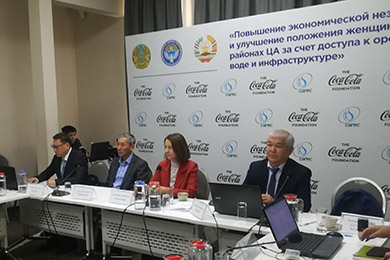Water Resources Management in Central Asia: Starting Small, Achieving Greater
Bishkek – Kyrgyzstan – A presentation of the large-scale Central Asian project “Enhancing economic independence and improving the situation of women in Central Asia through access to irrigation water and infrastructure” occurred today. The regional project focuses on the first concrete steps and actions by the local communities on the rational management of water resources in the region.
This problem is so crucial for all Central Asian countries that the Regional Environmental Center for Central Asia (CAREC) considered it timely and relevant to initiate a regional transboundary project on sustainable water use for Kyrgyzstan, Tajikistan and Kazakhstan. It is noteworthy that the relevant government agencies of the Central Asian countries jointly implement the project.
The total amount of the project is more than 500 thousand US dollars. There are more than 10,000 direct beneficiaries in Central Asian countries and more than 180,000 indirect recipients.
The regional project “Enhancing economic independence and improving the situation of women in Central Asia through access to irrigation water and infrastructure” covers Kazakhstan, Kyrgyzstan and Tajikistan. Financial support for this socially significant project is provided by the Coca-Cola Foundation.
Climate change, along with inefficient and outdated irrigation practices, has led to a reduction in irrigation water, which in turn hurts agricultural productivity and the socio-economic well-being of rural residents. It is especially true for women, as they are now responsible for most of the agricultural activities in the Central Asian region, as most men, especially from Kyrgyzstan and Tajikistan, migrate to other countries to earn money as wage labourers.
The lack of hydraulic infrastructure (pumps, watersheds, irrigation wells, drainage channels and traditional irrigation methods) makes it difficult for women farmers and women-headed farms to achieve higher yields and higher incomes.
The project, firstly, will help to solve the problem of water scarcity by introducing new irrigation methods and technologies without compromising crop yields. Second, farms and farms run mostly by women in Kazakhstan, Kyrgyzstan, and Tajikistan will be able to reduce their dependence on irrigation water scarcity, increase productivity, and generally improve the sustainability of agriculture in the region.
To achieve its goals, the project will work with local communities and government agencies in Kazakhstan, Kyrgyzstan and Tajikistan to identify areas most in need of irrigation water and infrastructure. Overall, this project aims to create sustainable change in the lives of women in Central Asia by providing them with access to basic resources and infrastructure to increase their economic independence, increase agricultural productivity and promote gender equality.
How will the project work?
Increasing agricultural productivity by piloting new water-saving technologies. The component focuses on testing and implementing innovative irrigation technologies that save irrigation water while increasing crop yields. This outcome aims to address water scarcity in each target area by introducing new irrigation methods and technologies that can reduce water consumption without compromising crop yields. By adopting water-saving technologies, women-led farms can reduce their dependence on scarce water for irrigation and increase agricultural productivity, improving food security and contributing to sustainable agriculture. The project will select 1 hectare for each district in each target country and test new water-saving technologies.
Empowering women economically through effective value chain approaches. This outcome aims to support women farmers and entrepreneurs in accessing new markets in the region, improving the quality of their products and adding value to their agricultural products through processing and packaging. Organization of a series of events where women farmers will find new partners for business – building a business network. Strengthening the institutional capacity of agricultural water management authorities and water user associations.
The third outcome aims to build the capacity of institutions responsible for the management and distribution of irrigation water, such as water authorities and water user associations. By strengthening their institutional capacity, these organizations can increase their ability to effectively manage water resources, ensure equitable access, and maintain all rehabilitated water infrastructure within the project. Changes in the institutional structures of water users reinforce the idea that CAREC and the international charitable foundation “The Coca-Cola Foundation”, through their development projects, help the government, primarily regional partner states, to fulfil their obligations by the principles of the Sustainable Development Goals (SDGs). As a result of the project, the economic situation of more than 10,000 people (5,662 women) will be improved and more than 180,000 people will feel the indirect positive effect of the project results.
Contact information: Abdurashit Isabaev, the Project Coordinator, wisadvisor@carececo.org

